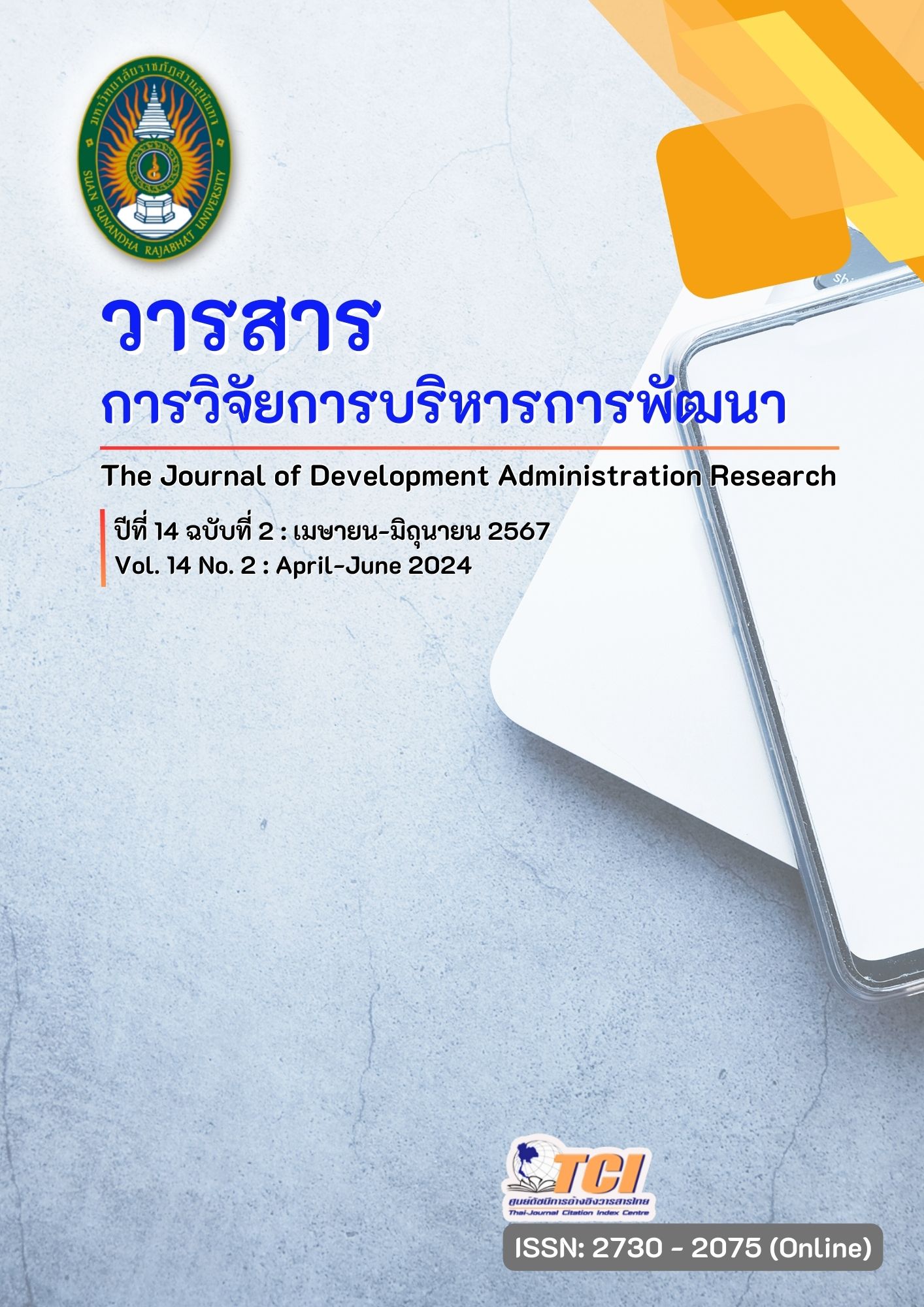The Moderator Roles of Subjective Norms and Marketing Mix in the Acceptance of the Non Fungible Tokens Technology on the Artwork Customer in China
คำสำคัญ:
Subjective Norms, Marketing Mix, Non Fungible Tokensบทคัดย่อ
This study aims to 1) investigate the factors affecting the acceptance of using NFT technology by consumers on the artwork products based on the moderated effect of subjective norms and marketing mix; 2) test the model of factors influencing the acceptance of consumers on the NFT technology and 3) explain the relationship between factors of consumers' acceptance of NFT technology on the artwork products. This study was mixed method research. Quantitative research employed a questionnaire as a data collection tool from investors 520 people obtained by purposive sampling. Data analysis including percentage, mean and Structural Equation Model (SEM). In Qualitative research, key informants of 30 people were obtained by purposive sampling and used in-depth interviews is a data collection tool. Data analysis including content analyst
The results were as follows: 1) Chinese NFT collectors and consumers are influenced by peers and family members in initiating the collection and use of NFT. Consumers pay attention to various NFT characteristics, emphasizing safety, trading aspects, quality, and the purchase and usage process, particularly focusing on payment security. 2) NFT consumers are very obviously positively influenced by their family members, peers and friends. As long as consumers have family members or peers and friends in the consumption, collection or use of NFT and 3) the quality of NFT artworks, the distribution platform, the purchase and use process, and the price of NFT artworks will also affect consumers' consumption and use of NFT. How to provide cheap and fine NFT art, to provide consumers with a good and convenient way to buy and use, this is also an important question whether NFT can achieve consumption.
เอกสารอ้างอิง
Ali-Suyanto, A.M.& Dewi, D.G. (2023). Marketing mix on purchase intention and its impact on the decision to purchase something products. Business review, 8(10), 1-21.
Alkandi, I et al. (2023). Green products buying behaviour of saudi arabian and indian consumers:a comparative study. International Journal of Professional Business Review, 8(10), 1-27.
Chunyan, H. (2022). The development status and future orientation of NFT Art. Cultural Industry, (3), 112-114.
Gupta, S. & Tomar,R. (2023). What drives the user’s continuous usage intention of video platforms? Identifying the role of cognitive absorption and perceived usefulness with the impact of Ott content on it. International Journal of Professional Business Review, 8(4), 01494.
Huisheng, X. (2023). On the generation logic, existence mode and value dimension of NFT art.School of Literature. Tianfu New Theory, (1), 137-149.
Kaiming, C. (2006). Features and applications of the structural equation model. Statistics and Decision-Making Press.
Min, W. (2023). Legal application and regulation of NFT. Northern Finance, (3), 77-80.
Saeidnia, H. R., & Lund, B. D. (2023). Non-fungible tokens (NFT): a safe and effective way to prevent plagiarism in scientific publishing. Library Hi Tech News, 40(2), 1819.
Shengnan, W., Tongrui, W. & Wenqin, L. (2018). Research on the purchase intention of conspicuous virtual products of e-sports games. China's management informatization, 21(17), 10.
Shuangzhou, L.& Zhiwei, G. (2023). Legal risk and compliance management of NFT digital work trading. Journal of Dongbei University of Finance and Economics, (1), 49-61.
Xiaodong, J. & Jian, Z. (2023). Are the emojis redundant? Research on the influence of emoji on the perceived usefulness of online product reviews. Journal of Management Engineering, 37(1), 66-77.
Ying, X., et al. (2022). Research and suggestions on money laundering risk of NFT from the perspective of anti-money laundering. Times Finance, (5), 93-95.
Yixuan, Z. & Yong, X. (2023). Value negotiation mode of the metaverse field NFT artwork. Industrial Economic Review, (1), 124-135.
Yonghao, N. & Jingyue, L. (2013). Perceived usefulness, trust and the willingness of social networking site users to disclose personal information. library and information knowledge. (5), 9.
Zhao Kai, Z. & Zhiyao, L.W. (2016). Big data and cloud computing technology to talk about. Guangming Daily Press.
ดาวน์โหลด
เผยแพร่แล้ว
รูปแบบการอ้างอิง
ฉบับ
ประเภทบทความ
สัญญาอนุญาต
ลิขสิทธิ์ (c) 2024 วารสารการวิจัยการบริหารการพัฒนา

อนุญาตภายใต้เงื่อนไข Creative Commons Attribution-NonCommercial-NoDerivatives 4.0 International License.
บทความที่ได้รับการตีพิมพ์เป็นลิขสิทธิ์ของมหาวิทยาลัยราชภัฏสวนสุนันทา
ข้อความที่ปรากฏในบทความแต่ละเรื่องในวารสารวิชาการเล่มนี้เป็นความคิดเห็นส่วนตัวของผู้เขียนแต่ละท่านไม่เกี่ยวข้องกับมหาวิทยาลัยราชภัฏสวนสุนันทา และคณาจารย์ท่านอื่นๆ ในมหาวิทยาลัยฯ แต่อย่างใด ความรับผิดชอบองค์ประกอบทั้งหมดของบทความแต่ละเรื่องเป็นของผู้เขียนแต่ละท่าน หากมีความผิดพลาดใดๆ ผู้เขียนแต่ละท่านจะรับผิดชอบบทความของตนเองแต่ผู้เดียว




